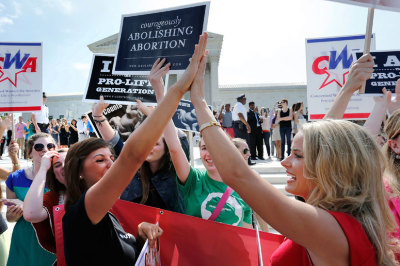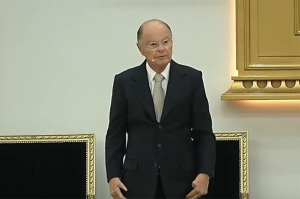Analysis: 3 Reasons Hobby Lobby Won

The U.S. Supreme Court ruled Monday that two Christian-owned businesses, Hobby Lobby and Conestoga Wood Specialties, do not have to comply with parts of the "Obamacare" birth control mandate that violate the owners' sincere religious beliefs. Here are three reasons for that decision, according to the majority opinion written by Justice Samuel Alito.
1. The Religious Freedom Restoration Act covers for-profit corporations.

The Religious Freedom Restoration Act (1993) covers non-profit corporations, all parties in the suit agreed, and the profit motive itself does not eliminate religious freedom protections.
There is no dispute that RFRA protects non-profit corporations, Alito wrote, so individuals that form a corporation still enjoy the religious freedom protections of RFRA. Plus, there is nothing in the profit motive of for-profit corporations that suggests religious freedom should no longer be protected. Alito cites Braunfeld vs. Brown (1961) in noting that the Court has already recognized the right to the free exercise of religion for retail merchants.
Additionally, laws already recognize that corporations are recognized as "persons" for the purposes of the law. Mark Rienzi, senior counsel for The Becket Fund for Religious Liberty, which represented Hobby Lobby, pointed this out in a Monday press call with reporters. In laws and cases dating back to 1870, he said, a "person" under the law has been recognized to include corporations.
"Any suggestion that for-profit corporations are incapable of exercising religion because their purpose is simply to make money flies in the face of modern corporate law," Alito wrote.
When Congress passed RFRA, Alito added, it "employed the familiar legal fiction of including corporations within RFRA's definition of 'persons,' but the purpose of extending rights to corporations is to protect the rights of people associated with the corporation, including shareholders, officers, and employees. Protecting the free-exercise rights of closely held corporations thus protects the religious liberty of the humans who own and control them."
2. HHS did not use the least restrictive means of accomplishing its goal.
Under RFRA, when a government action infringes upon religious freedom, it must show that is has a "compelling government interest" for doing so and it used the "least restrictive means" for doing so. This means that the government can, at times, infringe upon a person's religious freedom, but only if it has a really good reason for doing so and only if there is no other way to accomplish that goal without infringing upon religious freedom.
The Court did not look at whether HHS had a compelling interest in issuing the birth control mandate, but assumed, for the purposes of the case that it did. HHS did not show, however, that it used the least restrictive means to fulfill its goal.
"The Court assumes that the interest in guaranteeing cost-free access to the four challenged contraceptive methods is a compelling governmental interest, but the Government has failed to show that the contraceptive mandate is the least restrictive means of furthering that interest," Alito wrote.
If HHS wants to make sure that everyone can get birth control without a co-pay, there are lots of ways to do that without infringing upon anyone's religious conscience. Indeed, HHS tried to argue that it had no other way to fulfill its purpose even though it already provided exemptions to many others. In providing those other religious exemptions, HHS showed the Court that it can provide exemptions in the pursuit of its goal. This undermined HHS' argument that it cannot provide the exemption to Hobby Lobby and Conestoga Wood because that would undermine what it was trying to accomplish.
3. Religious convictions are what the individual says they are, not what the government says they are.
The Green family (owners of Hobby Lobby) and the Hahn family (owners of Conestoga Wood Specialties), should have no religious objections to the birth control mandate, HHS argued, because it would be their employees, not them, that would decide whether or not to use the objectionable forms of birth control. The Court found this argument unpersuasive because it is up to the individuals, not the government, to decide what actions are in violation of their religious beliefs.
"It is not for the Court to say that the religious beliefs of the plaintiffs are mistaken or unreasonable," Alito wrote.
In making the point, Alito cited a prior case involving a Jehovah's Witness who worked for a company making tanks. The Jehovah's Witness did not object to making the sheet metal used for the tanks, but when his employer moved him to a job making turrets for the tanks, he objected.
The state of Indiana questioned whether it was reasonable for the man to draw the line where he did. If he does not believe it is immoral to make the sheet metal used for the turrets, it should not be immoral to make the turrets themselves, the state reasoned.
The Court, however, held that it is not for the government to decide for the individual what is moral or immoral: "it is not for us to say that the line he drew was an unreasonable one."





























